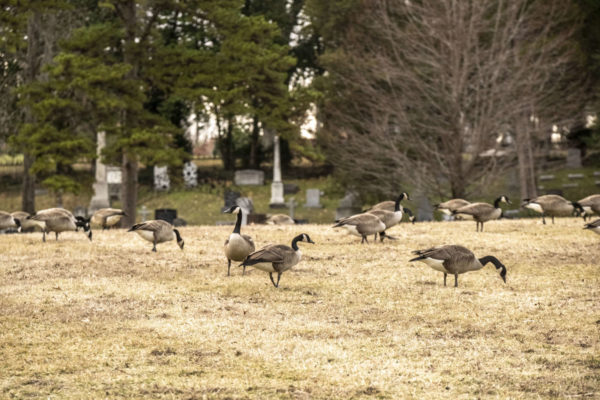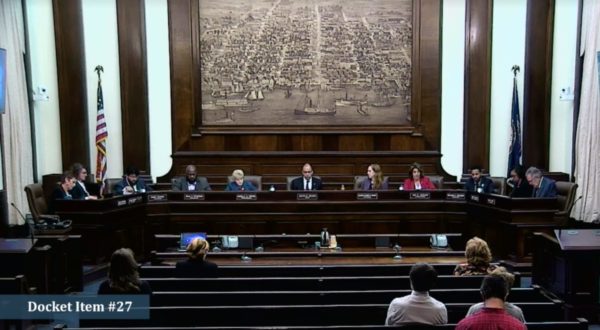The Alexandria City Council will consider making electric scooter rides cheaper in the poorest areas of the city at its meeting on Tuesday night (March 12).
Council will vote at City Hall (301 King Street) on allowing staff to apply for a $200,000 grant from the Better Bike Share Partnership’s Living Lab Program. The city would have to contribute $20,000 toward the effort, which is intended to increase the ridership with an outreach campaign and by lowering prices for electric scooters and e-bikes in Arlandria and the West End.
“The City will work with local community organizations to build awareness for micromobility equity programs and facilitate new member sign ups,” city staff wrote in a presentation going before Council. “This program would offset costs associated with Dockless Mobility trips that start or end within designated equity zones.”
Alexandria has tried to expand ridership in the two areas since launching its Dockless Mobility Program in 2019. Consequently, the city’s three permitted operators (Bird, Lime and Spin) must operate a percentage of their fleet within Arlandria (5%), west of Interstate 395 (10%) and between I-395 and Quaker Lane (15%).
Exactly how much riders who live in Arlandria and the West End will save is unclear, but the non-electric Capital Bikeshare has a program that allows low-income riders to ride their bikes for $5 per year.
The Living Lab Program is a partnership between the City of Philadelphia, the National Association of City Transportation Officials and the nonprofit People For Bikes. If the city is chosen for a grant, the program would be implemented this fall and run until Spring 2026, after which it would be evaluated, according to the staff presentation.
The city’s draft resolution is below.
WHEREAS, in 2021, the City Council of the City of Alexandria adopted a dockless mobility permit program that includes requirements to encourage equitable deployment and usage across the city; and
WHEREAS, in 2023 the Better Bike Share Partnership (BBSP) announced a Living Lab Program intended to address key barriers to access and use of shared micromobility; and
WHEREAS, City staff submitted a letter of interest and received an invitation to submit a full proposal; and
WHEREAS, the City Council of the City of Alexandria desires to submit an application to Better Bikeshare Partnership (BBSP) for up to $200,000 to participate in the BBSP Living Lab Program for 2024-2026; and
WHEREAS, these funds are requested to fund efforts to increase membership numbers in the Dockless Mobility and Capital Bikeshare equity programs, and to reduce the costs associated with dockless trips that either start or end within designated equity zones in the city.
NOW, THEREFORE, BE IT RESOLVED that the City of Alexandria hereby supports this application for an allocation of up to $200,000 through the BBSP Living Lab Program for 2024-2026.
BE IT FURTHER RESOLVED, that the Alexandria City Council hereby grants authority for the City Manager to apply for funds, allocate an additional $20,000 as a required 10% local match, and execute project administration agreements, as well as other documents necessary for approved projects.
Among the changes the city is making to its mobility plan, Alexandria is starting to lay the groundwork for autonomous vehicles on city streets.
There are currently serious concerns about the safety of self-driving cars, with specific concerns about the ability of these cars to reliably avoid hitting pedestrians and cyclists. But at the technology advances, city staff are still including plans for self-driving cars on Alexandria streets as a future possibility worth planning for.
The recognition of autonomous vehicles was noted as one of the changes highlighted at a Sept. 29 joint Transportation Commission and Alexandria Mobility Plan Advisory Committee meeting. Staff said that the city needs to be prepared for that future from a policy perspective.
The city is in the middle of a broad update to the original plan from 2008. The new Alexandria Mobility Plan includes several actions to help prepare for autonomous vehicles.
- Consider pilot projects to lay the groundwork for and evaluate the effectiveness
of various new technologies - Prepare for connected vehicles by developing maintenance and infrastructure
plans to ensure street readiness - Prepare for autonomous or self-driving vehicles by developing policies to manage
potentially significant increases in miles driven and traffic volumes within the city,
including limiting zero-passenger miles and incentivizing shared use - Ensure that safety is a priority when testing and implementing new technologies
Despite the current safety concerns, the Alexandria Mobility Plan said there’s potential for autonomous vehicles to be a roadway safety improvement, as well as an accessibility benefit:
Autonomous and connected vehicles have the potential to improve roadway safety, enhance mobility for persons with disabilities, and potentially reduce congestion. Vehicle technology is advancing quickly, and the City needs to be well-positioned to adapt to these changes. It is important to prepare for connected vehicle technology through strategic investments that accommodate vehicle-to-infrastructure and vehicle-to-vehicle communications, which will help travelers find parking spaces, avoid traffic and crashes, navigate hazardous conditions, and more. Proactive policy making and monitoring will be needed to address potential for increased travel and congestion associated with the development and deployment of autonomous vehicles.
The plan’s 20-year goals include accomodating self-driving vehicles, vehicle-to-infrastructure communications, and vehicle-to-vehicle communications.
In neighboring Fairfax, a self-driving shuttle started operation last year, though some drivers have been irked by the vehicle. Autonomous vehicles have also been used at Fort Meyer in Arlington. In 2017 a “driverless car” was spotted in Arlington, though it later turned out to be a car driven by a person disguised as a car seat.
Robbery in Landmark Area — “The Alexandria Police Department is investigating a robbery from person in the unit block of South Reynolds Street. Victim had items taken and received a minor injury. Expect police activity in the area.” [Twitter]
Alexandria’s Mobility Priorities — “The top four priorities for the future of transportation according to Alexandria residents are congestion management, safe and comfortable places to bike and walk, reliable and efficient transit and maintaining infrastructure. The Alexandria Mobility Plan team revealed those results from their community outreach meetings at seven locations in Alexandria and an online survey last fall.” [Alexandria Living]
VT Names Innovation Campus Director — “The new leader of Virginia Tech’s billion-dollar tech campus project in Alexandria is laying out his vision for it. Lance Collins comes from Cornell University, for which he helped open a tech campus in New York City. The Virginia Tech Innovation Campus is being built in the Potomac Yard area.” [Virginia Tech, WTOP]
Crash Near Hospital Yesterday Morning — “Police, medics on scene of a car that reported[ly] crashed into a tree on the 800 block of N. Howard Street, near the hospital. Road may be temporarily closed.” [Twitter]
North Potomac Yard, the Virginia Tech Innovation Campus, affordable housing and more! It’s budget season, and you know what that means — the Alexandria Planning Commission will soon begin looking into prioritizing city-related plans and studies with the updated Interdepartmental Long-range Planning Work Program.
So… what plans and studies will Alexandria focus on in the near future? Don’t worry, those interested will have plenty of meetings to attend.
The Planning Commission, on Tuesday, Jan. 7, will discuss a draft work program — which will “help inform development of the City Manager’s Proposed Operating Budget,” notes the city staff report, which also states that there are only “minor updates and additions” to the the work program that the city council approved in last year’s budget.
At the top of the list is streamlining plan and zoning updates for North Potomac Yard and Virginia Tech Innovation Campus. Council will vote on developmental special use permits and the Potomac Yard Master Plan this fall, the latter of which will be a blueprint into Alexandria’s future with the development of a Metro station, Virginia Tech’s $1 billion campus, a new elementary school, and residential and retail. It’s going to be an economic juggernaut for the city, and Development Special Use Permits.
Alexandria’s neighborhoods are evolving, and this fall city staff launched community meetings on updating the two Mount Vernon Avenue plans for Del Ray and Arlandria, which the commission and council will discuss early this year. Additionally, public meetings on the Duke Street Area Plan update will be held in the spring.
Equity/affordable housing made the list of development priorities, as the city’s Housing for All policy dictates that Alexandria “develop or preserve 2,000 affordable housing units through 2025,” notes the staff report. The city’s low cost, market-affordable (non-
Other plans to be prioritized are the Alexandria Mobility Plan and a number of park and natural resource plans, including the Pocket Park Plan, Urban Forestry Master Plan Update, Stream Valley and Trail Plan, Public Open Space Policy Plan and the Dog Park Master Plan update.



